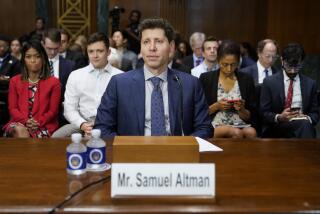Academies Warn of Warming
- Share via
The National Academy of Sciences and 10 similar organizations from some of the world’s most powerful nations released a statement Tuesday calling for a stronger international response to global warming, arguing there is now more than enough evidence of a changing climate to justify taking immediate action.
The unprecedented joint statement, politically timed to coincide with British Prime Minister Tony Blair’s visit with President Bush in Washington, called on developed nations to “acknowledge that the threat of climate change is clear and increasing.”
It also called on countries to begin setting stricter targets to reduce heat-trapping greenhouse gases to prevent the worst consequences of global warming from taking place.
The statement was signed by National Academy of Sciences President Bruce Alberts as well as the heads of science organizations from Brazil, Britain, Canada, China, France, Germany, India, Italy, Japan and Russia. That includes science academies from the Group of 8 industrial nations, as well as from the three largest emitters of greenhouse gases in the developing world.
“There will always be uncertainty in understanding a system as complex as the world’s climate,” the joint statement began.
“However, there is now strong evidence that significant global warming is occurring.”
The evidence includes direct measurements of rising air and ocean temperatures, retreating glaciers and changes to biological systems, the scientists wrote. They added that “it is likely that most of the warming in recent decades can be attributed to human activities,” such as the release of carbon dioxide and other greenhouse gases from the burning of coal and other fossil fuels.
In releasing the statement, the president of the British Royal Society, Lord Robert May, sharply criticized the Bush administration’s stance on climate change, which is focused on furthering technologies to cut greenhouse gas emissions and only asks that businesses make voluntary reductions.
The U.S., the world’s largest emitter of carbon dioxide, was the only major developed nation other than Australia not to sign the Kyoto Protocol, a pact to reduce greenhouse gas emissions to roughly 5% below 1990 levels by 2012. Blair has vowed to make climate change a central issue at next month’s G-8 summit in Gleneagles, Scotland. But the Bush administration appears firmly entrenched in its position that mandating reductions in greenhouse gases would hurt the U.S. economy.
“The current U.S. policy is misguided,” May said. “The Bush administration has consistently refused to accept the advice of the U.S. National Academy of Sciences. President Bush has an opportunity at Gleneagles to signal that his administration will no longer ignore the scientific evidence.”
The National Academy of Sciences first outlined the threat of global warming in 1979, when it published a now-famous report led by MIT scientist Jule Charney in response to a request by President Carter. It concluded that climate change was a serious threat and recommended that governments begin to reduce greenhouse gases as a precautionary measure.
Since the Charney report, the science academy has published several other reviews of global warming -- including one in 2001 that had been requested by Bush -- all of which have largely echoed the 1979 report’s conclusions.
Bush administration officials on Tuesday strongly disputed May’s criticism that the president had failed to heed scientific advice on global warming.
“We welcome the continued efforts and leadership of our U.S. National Academy of Sciences working with its sister societies to ensure that our response to climate change is informed by the best available scientific knowledge,” said Michele St. Martin, a spokeswoman for the White House Council on Environmental Quality.
“We are taking action,” she added. “President Bush has committed his administration to cut our nation’s greenhouse gas intensity by 18% over the next 10 years.”
More to Read
Sign up for Essential California
The most important California stories and recommendations in your inbox every morning.
You may occasionally receive promotional content from the Los Angeles Times.













